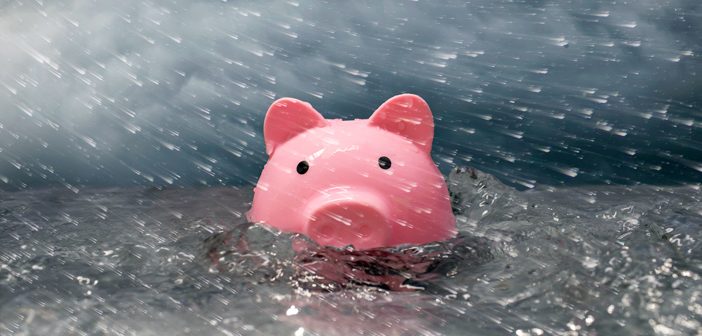When a major storm is headed your way, you prepare yourself. The same should be true for a recession. Many experts predict the U.S. economy is headed toward a recession. These tend to go hand in hand with major stock market declines and unemployment.
Most economists and financial advisors say that the best way to bolster your finances before a recession hits is to beef up your emergency savings, pay off any high interest, and, if practical, develop alternative income streams. The big caveat is that if a recession does happen soon and you haven’t already started preparing, you’re probably too late to prepare adequately.
Given the inevitable economic downturns sooner or later, financial planners recommend a long-term financial plan and outlook that accounts for future downturns. The bottom line? There’s no time like the present to start preparing. We have some insight, tips, and tricks with help from The Wall Street Journal, Fool.com, Time.com, and USA Today.
Be active, not reactive.
For many, financial vulnerability during a recession starts with poor spending and saving habits. Credit card balances have been growing over the past year and Americans’ personal savings rate was 4.60% at the end of January 2025, a 1.10% increase over December 2024, which is good news.*
Of course, telling someone on a tight budget to save may be easier said than done. A January 2025 survey by bankrate.com found that 59% of Americans said they couldn’t cover an unexpected $1,000 in expenses.** All the more reason to take a longer-term and not a reactive approach to savings.
Most of us can’t renovate our finances on the spot, but we can take incremental measures in the right direction. It all helps. For example, search for a higher-yield account if your cash is earning a low yield. Our Online Savings account offers 3.50% APY† with Direct Deposit (2.00% APY without it) – that’s more than 8x the national average.‡
Look for ways to trim some discretionary expenses. Canceling subscriptions you no longer use, cutting back on dining out, and going through what you have before buying anything new can help you save significantly.
Adopt a flexible mindset.
Even if your job or industry seems secure, your job may become vulnerable. Job losses that start in a few companies in one sector can quickly spiral and expand to other industries. If you are less than confident your company won’t have layoffs, consider delaying big financial decisions that could lock you into large recurring payments like buying a new home. Also, have an adaptive mindset. Keep an eye on the job market and potential alternative income streams. Research how much unemployment you may be entitled to and how long benefits will be paid. Do you have an extra vehicle or items you no longer use? Now could be a good time to sell before a recession takes hold and people are less likely to buy.
Make an action plan.
1. Understand your financial situation.
Make a budget if you don’t already have one. Using an online resource can help, and your Credit Union is a good place to start. Check out our best-in-class budgeting tool in our Financial Education Center. As part of the exercise, scan bank statements and recurring payments. Then estimate:
- The gap between income and expenses. If you barely cover your expenses, or worse, look for ways to cut costs or increase your earnings.
- If you were to lose your job tomorrow, how would you cope? Consider how much cash you have ready to tide you over for a few months, and figure out what non-essential spending you could cut if needed.
2. Prioritize your emergency fund.
Keep your emergency fund in a separate savings account so you don’t get tempted to dip into it for regular expenses. Estimate how much you’d need a month to get by without a job, and save up to meet that goal. Remember, you could be out of work for a while, so experts recommend you have up to six months of savings. Your Credit Union has a number of high-yield savings accounts, including our Rainy Day savings account. Learn more here.
3. Pay down high-interest debt.
If you carry high-interest debt, look for ways to pay it down. Your Credit Union has excellent Credit Card and loan rates and can help you consolidate and lower debt. One big benefit is that you’ll free up some of your monthly budget to save or spend on yourself rather than on interest. A smaller debt payment will make life easier if your income suddenly drops.
It’s often harder to borrow money in a recession. If you can reduce your credit card debt now, you’ll have leeway to borrow again if things get tough. Another side benefit is that you may also improve your credit score. Paying down card debt can improve your credit utilization ratio (card debt relative to the total credit available on all your cards), which is a key factor in calculating your score.
4. Take steps to recession-proof your career.
We’ve touched on some of the big financial steps you can take, but what about your career? If you’ve been thinking about switching jobs, what qualifications might you need to make the jump, and what do you need to do to get them? Start investigating classes, certificates, and degree programs now.
If you like your current job and career, are there moves you can make today to improve your standing at work to avoid being cut if layoffs occur? Can you volunteer for additional responsibilities or learn skills to help you stand out? There are no guarantees, but positioning yourself as a positive and adaptable colleague never does any harm.
It’s also a good idea to update your résumé and keep in contact with your professional network. It’s often easier to be specific about your skills and achievements when you have a job than when you’re sitting at home worried about your next steps.
5. If you have savings to invest, be savvy about it.
The stock market typically slumps before a recession begins and rebounds before the economy improves, so heading into a recession can be a good time to buy stocks when prices are lower. To reduce your tax obligations, you can also sell some losing investments, or what’s known as tax-loss harvesting.
The market will likely remain volatile as professional investors assess recession odds, and it could take some time for stock prices to bounce back from a market selloff. That’s why investing with money you don’t immediately need is essential over the next few years. Use it for a down payment on a home (if you have enough funds saved), for retirement, or to establish a college fund.
Final thoughts.
Recessions are a part of every economy. When they hit and how long they last can’t be predicted with certainty. Putting your head in the sand and hoping it won’t happen or affect you may not be the wisest move. Taking steps now to increase saving, lower spending, eliminate debt, and invest in yourself can help you weather the recession storm until sunny days come again.
Note: The information provided here should not be considered investment, tax, or financial advice. You should consult with a licensed professional for advice concerning your specific situation.
*Federal Reserve Bank of St. Louis, “Personal Saving Rate.” Fred.stlouisfed.org. Published 28 February 2025. Accessed 14 March 2025.
**Lee, Anne Marie, “Most Americans can’t afford a $1,000 emergency expense, report finds.” CBSnews.com. Published 23 January 2025. Accessed 14 March 2025.
†APY = Annual Percentage Yield. APY is the annualized rate based on a compounding period of one year. When the deposited money earns dividends and the accumulated dividends starts earning dividends as well, we are talking about compounding. Fees could reduce the earnings on an account. All yields except Certificate yields are subject to change retroactively to the beginning of the month.
Rate bonus is for a minimum of $1,000 monthly ACH Direct Deposit or Agent Net Check into a Farmers Insurance Federal Credit Union Checking Account. Rates are subject to change at any time. No branch or call center access with this account.
‡The national average for this type of account is 0.42% APY, based on rates published in the FDIC Monthly National Rates and Rate Caps accurate as of 01/21/2025.





